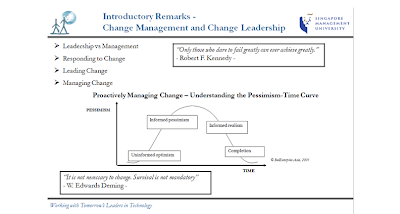The group discussed the growth of tablet technology... One thing that dawned on me as they presented was their point on 'ease of use', especially with touch screen technology, the group mentioned a little bit on how kids, and I mean young kids, can start using the iPad with such ease and within seconds, it's almost baffling. Well I think this just speaks volume of the 'naturality' of such technology.
The group also posed a question to the class - do we wear watches? A bunch of us still do and the group mentioned how we, humans, love multi-tasking objects, so we rely on our phones for the time, the weather, for setting an alarm, to remind us of deadlines and whatnot. Well I see the point that the group was trying to make, except most of us actually raised our hands! But then again, perhaps the whole function of a watch has changed. It has become an accessory. It is multi purpose now!
During the Q&A session, one of our classmate questioned if we were really going to replace PC with tablet technology in offices. I believe this appears to be the direction we are taking. Both my brother and dad's office replaced all desktop with laptops.. and perhaps they will slowly attempt to replace laptops with tablets. There is really no reason why we shouldn't, with advancing technology, tablets should be able to perform the same tasks that a PC does. I certainly look forward to the day where tablets are the norm. Besides, this 'disruptive' trend will offer opportunities for businesses - if they are able to manage the 'changes' in computer trends. A laptop maker doesn't always have to make laptops.
This is the most interesting presentation I've seen in SMU, the transitions were funny, group members actually 'pushed' each other off the stage and free perfume samples were given out to people who asked their questions. The project was basically on how technology 'enabled' beauty, which is an interesting topic and was probably a fun research topic. One would expect the group to dwell on surgical processes but they didn't!
Technology has enabled beauty - no one can argue that. When the group discussed the future of beauty, it dawned on me that the future direction appears to be more secretive, you pop a perfume pill (almost as though you smell perfect inside and out), you use dissolvable lenses (no need for contact lens or glasses - nobody has to know you're short sighted), you create a perfect baby (nobody has to know your true self as you can just put in genes and stuff you like). Perhaps the goal is to look beautiful naturally and no one needs to know you had those procedures.
Well, in any case, I felt that the group could have discussed the use of technology in creating creams and lotions. In recent times, I do believe none of us have been able to pass cosmetic halls in department stores without huge posters from luxury brands claiming that they have some special nano particles or timed 'particles' or whatever in their creams that promises to make you young and beautiful.
This project focused on the use of social media in elections and politics... The advent of social media has changed the face of communication in all areas. The group discussed the impact of social media in elections campaign.
Well, although I had to vote, I wasn't entirely up to date on all of the campaign happenings. From what I know, social media helped to highlight every detail of the candidates involved.
Communications online - whether from the candidate himself or stemmed from discussions of netizens... will be dissected and pull apart and commented on and re-tweeted and whatnot. This only goes to show that activities online and on social platforms needs to be monitored closely. More firms are actually making sure their employees take a course on how to communicate effectively online.
The group discussed the use of technology in terrorism and counter terrorism.. I thought the presentation was very clear and concise. The presentation offered insights into how technology is used to create terror and stop terror.
I believe communications between rioters in the London 2011 riots depended on BlackBerry messengers, FB, and twitter.. Obviously these technologies were not invented for the purpose of organizing riots. However, it was created to allow seamless/fuss free communication between people across the globe and etc, technology will often offer us opportunities and it is up to us to use that opportunity and we could use it for both good or bad. I suppose this is where technology assessment or change management (esp in the workplace) comes in to ensure that the 'changes' caused by technology are primary good.
And that marks the end of our class!



